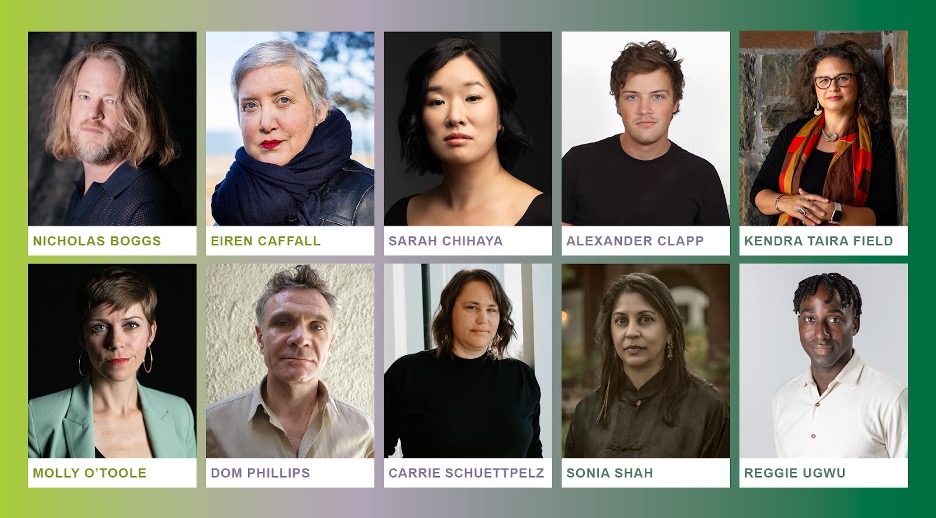Ten writers have won the Whiting Foundation’s Creative Nonfiction Grant for 2023. Now in its eighth year, the $40,000 prize aims to support multi-year book projects. Unlike the $50,000 Whiting Awards for emerging writers, authors can apply for the Creative Nonfiction Grant; judges award applicants whose work “displays singularity of voice, arresting narrative vision, a clear contribution to our culture at large, and in-depth, quality research,” according to a statement from the foundation.
The winners include Nicholas Boggs for James Baldwin: A Love Story, a consideration of Baldwin’s relationships with his mentor, lover, and two artistic collaborators, forthcoming from Farrar, Straus and Giroux; Eiren Caffall for The Mourner’s Bestiary, which investigates the loss of marine ecosystems in the Gulf of Maine and the Long Island Sound alongside the story of a family’s battle with a serious illness and the author’s own family history of a genetic kidney disease, forthcoming from Row House Publishing; Sarah Chihaya for Bibliophobia, a blend of literary criticism and memoir examining readers’—including the author’s—affective relationships with books, forthcoming from Random House; Alexander Clapp for Waste Wars: A Journey Through the World of Globalized Trash, a journalistic examination of the international garbage business and its geopolitical consequences, forthcoming from Little, Brown; Kendra Taira Field for The Stories We Tell, which investigates African American family narratives from the Middle Passage to the present, forthcoming from W. W. Norton; Molly O’Toole for The Route: The Untold Story of the New Migrant Underground, which explores a migrant passage from Brazil to the U.S.–Mexico border, forthcoming from Crown; Dom Phillips with collaborators for How to Save the Amazon: Ask the People Who Know, a “character-driven” narrative of travel through the imperiled rainforest, forthcoming from Manilla Press, an imprint of Bonnier Books in the United Kingdom; Carrie Schuettpelz for The Indian Card: A Journey Through America’s Native Identity Problem, about the nuances of Indigenous ethnicity in the U.S., forthcoming from Flatiron Books; Sonia Shah for Special: The Rise and Fall of a Beastly Idea, which troubles the notion of human exceptionalism among other animals, forthcoming from Bloomsbury; and Reggie Ugwu for Brilliance Is All We Have: Black Filmmakers and the Fight for the Soul of America, a deep-dive into the history of Black American cinema, forthcoming from Bloomsbury.
Each of the winning projects underwent two first-round readers, who considered the “substance, narrative skill, quality of research, and impact” of the work. Sixteen finalists were evaluated by a panel of four judges, who chose the final ten grantees based on how the grant would contribute to the book. Experts in the field of work under consideration, readers and judges served anonymously to keep them from feeling pressure to choose any one work over another.
“This year’s grantees are doing venturous work, reporting from often hostile places on complex matters of deep import to us all,” Courtney Hodell, Whiting’s director of literary programs, said in a statement. “For some, the journey is an inward one. All these writers are animated by a drive for beauty as well as truth, and this combination is what makes books endure. Whiting is thrilled to support such risk-taking.”
To learn more about the Whiting Foundation’s Creative Nonfiction Grant, visit the foundation’s website. Check out the Grants & Awards database and Submission Calendar for more contests in poetry, fiction, creative nonfiction, and translation.
Photo credits: Boggs: Rachel Eliza Griffiths; Caffall: Jacob Hand; Chihaya: Beowulf Sheehan; Clapp: Markos Kovaios; Field: Alonso Nichols; O’Toole: Beth Mickalonis; Phillips: Alessandra Sampaio; Schuettpelz: Jess Barnett; Shah: Glenford Nuñez; Ugwu: Tony Cenicola.




